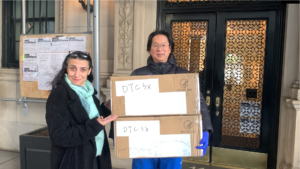March 10, 2020
Coronavirus: 1, World Markets: 0
Yesterday, stock markets suffered their worst day since the 2008 financial crisis, with the Dow dropping almost 8%, before beginning a slow rebound today.
Though most of the decline was driven by an oil price war between Saudi Arabia and Russia that drove oil prices down 20%, there are also substantial “fears that the coronavirus will disrupt global supply chains and tip the economy into a recession,” per CNBC.
To close or not to close?
Harvard University has joined a growing wave of schools at all levels (elementary, high school, and college) across the U.S. who are either cancelling classes outright or attempting to implement internet-based remote learning en masse. If Harvard is doing it, it must be the right move, right?
- But this is precisely the question: are the draconian city- and region-wide shutdowns like those implemented in China effective and necessary? And even if they are effective, are they possible in non-authoritarian countries?
South Korea may provide hope that draconian measures are indeed not necessary. If their government’s numbers are accurate, then there is emerging evidence that curbing the spread of the virus is possible without virtually shutting down society and commerce.
But the South Korean model relies on rigorous, consistent adoption of precautionary measures throughout society. To this point, Singaporean health minister Gan Kim Yong has highlighted how irresponsible actions by just a few people may lead to unnecessary spreading of the disease.
Supporting Yong’s claim that a few bad actors can override the best precautions is the outbreak in Hanoi, Vietnam, which has been traced back to one specific individual who returned home from a trip in London.
- Reality check: Many observers say COVD-19 has exposed the flaws in China’s political system, but the epidemic is also going to challenge the U.S. and other democracies.
Around the world in 30 seconds
A roundup of other news related to the virus from around:
- Italy has placed its entire population of 60 million people under lockdown (AFP)
- Apple EU headquarters employee contracts virus (Apple Insider)
- Multiple U.S. airlines are waiving cancellation fees and cancelling domestic flights (Vox)
- China’s government is signalling that the worst may be over in that country, as President Xi Jinping visits Wuhan, the center of the outbreak (CNN)
Cure and vaccine radar
If you Google “coronavirus cure” or “coronavirus vaccine,” you’ll see that literally hundreds of universities, drug companies, and governments around the world are in a mad rush to develop vaccines to prevent or treatments to cure the coronavirus.
So far, none have succeeded. But there is one that stands a chance — a drug called remdesivir. From The Guardian UK:
“As the coronavirus outbreak has unfolded, about 300 separate trials into different drugs and experimental therapies have been launched in the absence of any established treatments. Many see remdesivir, originally developed to treat Ebola, as a frontrunner and one of the very few drugs that has a reasonable prospect of helping patients in the near-term.”
Our expectation of a quick fix remains limited, because if this or any other solution were showing undeniable promise it would likely be getting more media coverage. The limited media coverage is likely in proportion to the drug’s limited promise. We hope we’re proven wrong!
If you found this newsletter helpful, please share it with your friends and family.
Take care, and don’t forget to wash your hands!






